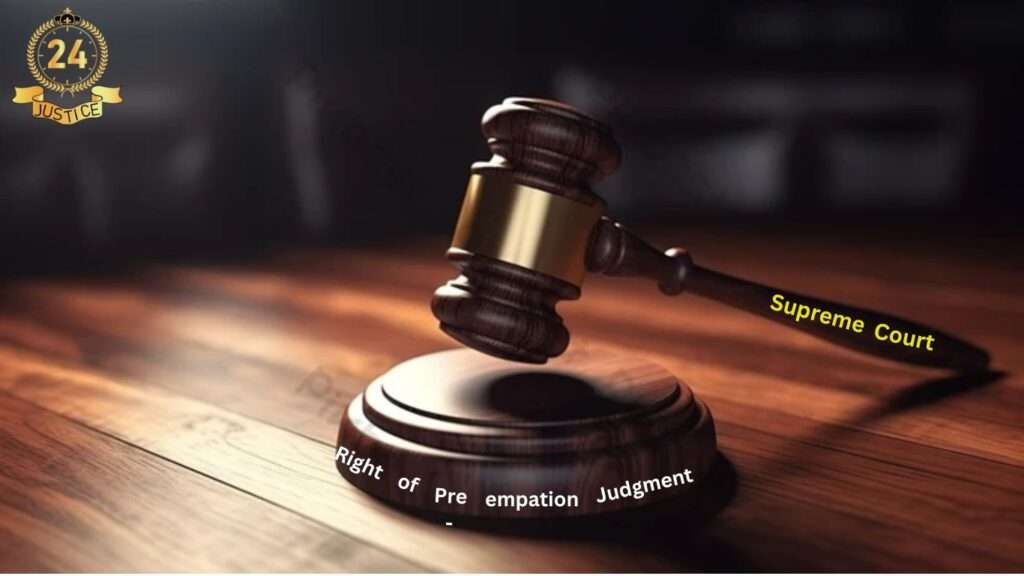Right of Pre-emption
Who, when, and how can use right of pre-emption? What is its legal status in today’s era?
This term known is known as the Shufa in Urdu. The purpose of this law was to prevent outsiders from entering and purchasing land where families and communities have lived together for generations.
On which lands is this law not applicable?
This law does not apply to inherited property, mainland acquired through gift, waqf property, or estate given by a husband to his wife as dower, etc.
Crux the right of pre-empation law
- The right of Shufa is a legal right that allows a person to purchase estate before others.
- This right is granted to co-sharers, neighbors, and those who have a passage or waterway through the land.
- To exercise this right, a person must declare their intention to purchase the land in the presence of two witnesses and send a legal notice to the buyer.
- If the buyer refuses to sell, the person can file a lawsuit to claim their right.
- However, if they fail to file a claim within one year, their right of pre-emption will be lost.
Right of Pre-emption case, the Supreme Court of Pakistan
In tribunal, delivered a judgment that has far-reaching implications. The case, Civil Appeal No.795 of 2017, involved a dispute over the right of pre-emption under the Khy Pakhtunkhwa Pre-emption Act, 1987.
- Parties: Kashmali Khan & others, versus Mst. Malala, the respondent.
- Legal Representation: Mr. Abdul Samad Khan represented the appellants, while Mr. Zia-ur-Rehman Khan and Syed Rifaqat Hussain Shah represented the respondent.
- Date of Hearing: 18.05.2023
Case Overview
The case revolved around a area parcel in Mouza Hisra Barani Payan, Tehsil Tongi, measuring 100 kanals and 19 marlas. The dispute arose when the defendant purchased the land for Rs.500,000/-, triggering the appellants’ right of pre-emption.
Judgment
The lower Court had initially ruled in favor of the appellants, recognizing their right to preemption the sale. However, on the defendant’s revision application, the High Court overturned the decision, leading to the appeal in the Supreme Court.
The summry of the matter lay in the appellants’ compliance with the preemption requirements, particularly regarding the demands or “Talbs” necessary for pre-emption exercise. While the appellants successfully proved their Talb-i-Muwathibat, they faltered in fulfilling the formalities of Talb-i-Ishhad.
Legal Observations
The Supreme Court emphasized the meticulous adherence to procedures, highlighting the importance of disclosing witness names for Talb-i-Ishhad. The omission of this crucial information, combined with other deficiencies in the appellants’ actions, led to the dismissal of their claim.
Contact us for more Information
In a rigorous application of pre-emption laws, the Supreme tribunal ultimately dismissed the appeal, underscoring the stringent nature of pre-emption rights. The judgment serves as a precedent in shufa cases, setting a benchmark for legal compliance and procedural conformity.
In a landmark ruling by the Supreme Court, this preemption case highlights the significance of procedural diligence in upholding legal rights and obligations. The PDF for the full citation is below for reference
24Justice Pre-empation 795 SC 2017
Our panel of skilled Lawyers in Pakistan specializes in shufa cases in Pakistan and offers personalized advice and robust lawful solutions.
- AI Legal Site: For general information, visit 24Justice.com – Pakistan’s First Legal AI Site.
- Personalized Assistance: For more specific queries or legal representation, reach out to us:
- Call: 0092 308 5510031
- WhatsApp: 0092 308 5510031
- Contact Form: Prefer writing? Fill out our contact form below, and we’ll respond promptly.
[wpforms id=”4658″]



